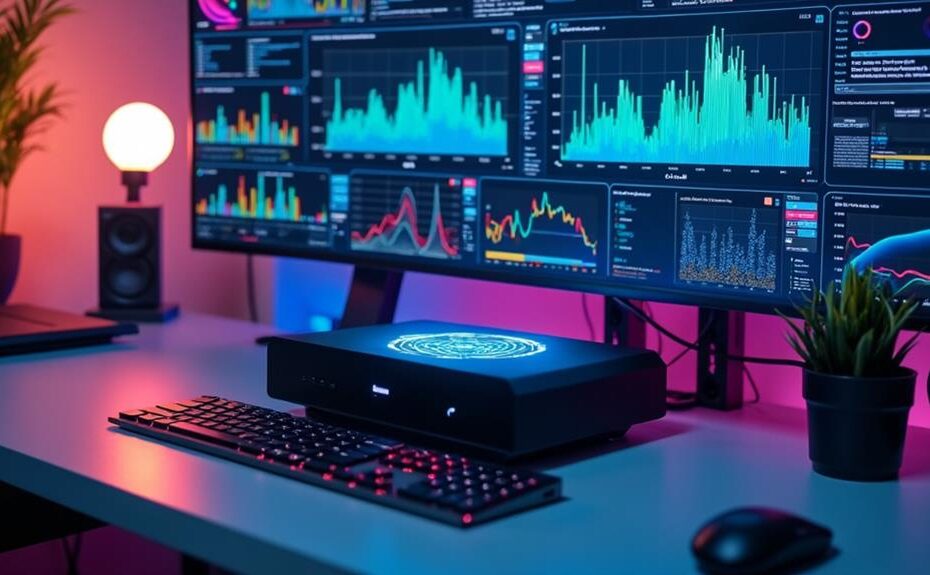



Mini PCs handle virtualization demands by leveraging powerful processors, such as Intel Core i7 or AMD Ryzen, that support advanced virtualization technologies. You'll want at least 8GB of RAM, though 16GB or more greatly enhances performance for resource-intensive tasks. Their hybrid storage options, combining SSDs and HDDs, improve management of multiple virtual machines efficiently. Effective cooling mechanisms are vital to prevent overheating during intense operations, while ample connectivity options guarantee seamless network integration. By evaluating these features, you can determine the best mini PC for your needs, revealing further insights into optimization and selection.
Key Takeaways
- Mini PCs utilize powerful processors like Intel Core i7 and AMD Ryzen to efficiently manage multiple virtual machines and operating systems.
- A minimum of 8GB RAM is recommended, with 16GB or more significantly enhancing performance for demanding virtualization tasks.
- Hybrid storage solutions, incorporating SSDs and HDDs, allow for fast data access and ample capacity for virtual machine management.
- Effective cooling mechanisms in mini PCs help prevent overheating during resource-intensive virtualization operations, maintaining optimal performance.
- Multiple connectivity options ensure seamless integration into existing networks, supporting robust virtualization setups.
Overview of Mini PCs
Mini PCs, often resembling small boxes, pack powerful performance into a compact design that serves a variety of applications. These energy-efficient computers leverage low-power processors such as Intel Celeron or AMD Ryzen, making them ideal for basic productivity tasks while consuming considerably less energy than traditional desktops. For instance, the ACEMAGICIAN Mini PC features an AMD Ryzen 7 5700U processor, which provides enhanced multitasking and gaming capabilities. You'll find RAM capacities ranging from 4GB to 16GB, paired with SSD storage options that enhance performance and reliability.
The compact nature of mini PCs allows them to fit seamlessly into any workspace, whether it's a small office, home lab, or educational environment. Their design not only saves space but also facilitates easy portability. When it comes to connectivity, mini PCs excel; they typically offer multiple USB ports, HDMI outputs, and wireless networking capabilities, which enable effective integration into existing setups.
This versatility is particularly advantageous for virtualization, as it guarantees that you can connect to various peripherals and networks without hassle. Overall, mini PCs stand out due to their powerful performance capabilities, strong processors, ample storage options, and robust connectivity, making them a smart choice for those seeking compact computing solutions.
Virtualization Capabilities
When considering virtualization capabilities, compact systems like mini PCs can hold their own against larger desktops, thanks to their powerful processors such as Intel Core i7 or AMD Ryzen. These processors provide the computational power necessary for running multiple operating systems through advanced virtualization technology. The impressive processing power of devices like the Intel NUC 12 Pro Mini PC further enhances their suitability for demanding virtualization tasks. With a minimum of 8GB RAM recommended for basic tasks, opting for 16GB or more greatly enhances performance, especially for demanding workloads.
Storage is another critical aspect; mini PCs often combine solid-state drives (SSDs) for speed with traditional hard drives (HDDs) for ample storage capacity. This hybrid approach allows for efficient management of both the operating systems and data across various virtual machines. Additionally, effective cooling mechanisms, such as integrated fans and optimized airflow designs, are essential in preventing overheating during resource-intensive tasks.
Moreover, mini PCs typically feature multiple connectivity options like USB and Ethernet ports, ensuring seamless integration into existing networks and support for various virtual environments. Their small form factor doesn't compromise performance, making mini PCs an attractive choice for those needing robust virtualization capabilities.
Recommended Mini PCs
Exploring recommended mini PCs reveals a range of options that excel in virtualization tasks, balancing performance and compact design. The GEEKOM Mini IT11, priced at $599, showcases an 11th Gen Intel Core i7-1195G7 processor, backed by 32GB of RAM (expandable to 64GB) and a 1TB M.2 SSD. This configuration makes it ideal for running multiple virtual machines efficiently. Additionally, the Beelink SER5 Mini PC, with its powerful AMD Ryzen 5 5500U and 16GB DDR4 RAM, offers great performance for virtualization needs, especially for users who require efficient multitasking and quick storage solutions, making it a compelling choice for those seeking value in compact computing solutions.
For those needing higher performance, the GEEKOM AS 6 features an AMD Ryzen 9 6900HX processor combined with 32GB DDR5 RAM, catering to demanding virtualization workloads, though its price isn't specified. If you require a more budget-friendly option, the GEEKOM Mini IT8 supports up to 32GB of RAM and integrates an 8th Gen Intel Core i5-8279U processor, suitable for lighter virtualization tasks, with flexible storage options including SSD and HDD expansion.
All these mini PCs incorporate Wi-Fi 6, guaranteeing reliable network performance, which is critical in virtualization environments. Their compact design not only saves space but also guarantees that you don't compromise on processing power when managing multiple virtual machines.
Benefits of Mini PCs
The advantages of utilizing mini PCs for virtualization tasks are increasingly apparent, especially when considering their compact design and energy efficiency. These devices offer low power consumption, making them an affordable solution for small businesses looking to implement virtualization without incurring high electricity costs. With powerful processors like Intel Core i5 or i7, mini PCs can efficiently manage multiple operating systems and virtual machines, facilitating software testing and development.
Their compact form allows for easy placement in limited workspace environments, enhancing organizational efficiency. You can integrate mini PCs into existing network infrastructures thanks to a variety of connectivity options, which provide the flexibility required for robust virtualization setups. This adaptability not only maximizes your IT resources but also streamlines operations, allowing your team to focus on core tasks rather than hardware constraints.
Moreover, the lower hardware costs associated with mini PCs make them a compelling choice for small businesses aiming to leverage virtualization technology effectively. By choosing mini PCs, you gain access to powerful, versatile systems that deliver strong performance while maintaining a minimal footprint, ensuring that you can meet your virtualization demands without compromising on space or budget.
Key Considerations for Selection
Selecting the right mini PC for virtualization demands careful consideration of several critical factors. First, opt for a powerful multi-core processor, such as an Intel Core i5/i7 or AMD Ryzen, to guarantee that performance remains robust when running multiple virtual machines simultaneously. A minimum of 16GB RAM is crucial, as it supports demanding virtualization tasks; consider models with upgradeable RAM to future-proof your setup.
Storage is another key aspect. A combination of SSDs for rapid access times and HDDs for additional capacity is ideal. This configuration allows for adequate space for both host operating systems and numerous virtual machines.
Effective cooling mechanisms are essential to prevent overheating during resource-intensive operations. Look for mini PCs with integrated fans and optimized airflow designs that guarantee consistent performance under load.
Disclosure: As an Amazon Associate, I earn from qualifying purchases.




